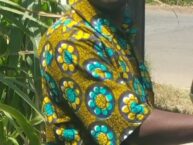 Pemi Aguda writes short stories and flash fiction. Her stories have appeared in The Kalahari Review, Black Fox Literary Magazine, Prufrock Magazine, The Wrong Quarterly and the TNC anthology ‘These Words Expose Us’ among others. “Caterer, Caterer” is shortlisted for the 2015 Writivism Short Story Prize.
Pemi Aguda writes short stories and flash fiction. Her stories have appeared in The Kalahari Review, Black Fox Literary Magazine, Prufrock Magazine, The Wrong Quarterly and the TNC anthology ‘These Words Expose Us’ among others. “Caterer, Caterer” is shortlisted for the 2015 Writivism Short Story Prize.
“CATERER, CATERER”
They are building a church. They say it is going to be bigger than both the whole of Sabo and Ladoja joined together. They say it will rise so high that we will not be able to see the hills of Agbara that touch the sky in the distance; that it will be so tall that it can only force our eyes to go up. To God.
I don’t know anything about buildings. All I know is the smack- ing of fists against our wooden door if we do not pay the landlord rent on time. I also know food. I know ponmo that squishes between your teeth, so tender that you close your eyes. I know smoky jollof rice with grains that do not hold on to each other in solidarity. I know efo riro that will dribble out the side of your mouth so that your wife knows that you tasted another woman’s kitchen and found it superior to hers.
It is why I am in this Keke Maruwa that is hurtling down the street, entering every pothole on the road as if its tyres are suicidal. We have seen no other person since we turned into this narrow, winding road and the engine of the Keke Maruwa echoes in the emptiness.
I have been called to cook for the people celebrating the laying of the foundation for this church that will be taller and bigger than all the buildings I have ever seen. My husband does not like the church people – Pastor Pascal and his flock. But the money I get will pay the rent. Twice.
Biyi says to me, “Why is a man who can talk to God wearing a green suit? Why hasn’t God told him that he looks like the spirogyra that dances in our gutters?”
And I say to Biyi, “Na you know.”
Because Biyi doesn’t like anything that is different from his past; it is as if he has painted his memories in very coloured detail so that he can compare every new idea to them. But I don’t mind anymore; not since he broke his legs and stopped teaching. Biyi no longer talks to me like a stupid girl that your mother sends from the village – the kind that jumps when you put on a TV. He now talks to me like a real wife. It took Biyi losing his legs for me to start enjoying this marriage. It is always nice when someone you love finally loves you back.
The Keke drives as though the spirit of someone whose land he stole is trying to catch up with us. But I do not complain. I pull my bag closer so that it does not fly out at the next pothole. They told me that they would buy all the ingredients. That I should just come and cook. But how am I to be sure that they bought the right type of bay leaf? That the iru they bought isn’t too dry? So I have brought a few of my own things, just in case.
Finally we get to the church site. The walls are so high that if four of me were to balance on each other’s shoulders, we still wouldn’t reach the top. The lights are enormous and push away the darkness of early morning. The walls are painted in a funny shade of pink – like stew gone bad. I wrinkle my nose and knock on the black gate that bears no church signage.
The gate creaks open and a man is standing there in a suit that looks like Pastor Pascal’s, but his is in brown – the colour of sand in my mother’s village. Brown-red. It is an ugly suit. It is big at the shoulders but the man stands tall and reminds me of an over-confident villager who has borrowed his uncle’s suit for a city interview.
Biyi will say: “Aha, aha! All the colours of the rainbow. They will stand side by side – bedazzling and bamboozling the people. Look at them, look at them; I am sure they are diabolical like their smooth politician friends.”
And I will say: “Na you know oh.”
Because I think if Pastor Pascal gives out tubers of yam every other month, at least he is doing community development. He even gave the Grammar School a generator. That one is better than the Local Government Chairman who will neither offer yam nor fix the road. I don’t care if Pastor Pascal slaughters a few chickens in some Babalawo’s shrine; me, I sha don’t attend his church. Biyi and I stopped going to church long before Pastor Pascal and his people appeared around here with their plenty money and miracles.
“Yes?” The man looks behind me to see if I am alone. I think he is overdressed for a security man.
“I am the caterer,” I say. “They said I should come at six o’clock.”
“Yes. Oya come inside.”
He motions for me to follow. I squint so that I have something to tell Biyi when I get back, but all I see is land, and more land. I see a building, but from where I am it is as small as the toys my nephews play with. I should even remember to buy something small for Iya Sadiq’s sons, maybe those fish biscuits that my nephews like, as ‘Thank you’ for referring me. She was supposed to do this job but she had to travel suddenly to care for her ill father or mother, or was it uncle?
She and those oddly skinny boys of hers had just disappeared sha. I have never prayed for wickedness on anyone oh, but we have to be grateful no matter how an opportunity decides to dance into our lives. Especially since Iya Sadiq and I are not even friends like that, she being my competition in this business and all.
By the time we get to the building, my breath is like exhaust from a generator about to die. There is a thin woman standing outside the small wooden building. She is wearing jeans and a t-shirt that has the church logo on it: Light of Praise & Glory Ministries of the Restored.
She is wearing red lipstick.
“What’s in your bag?” she asks, waving at my bag as if it is trash.
She does not smile when she asks, which would have made it better – I would have seen it as a joke. Can she ask her own mother what is in her bag? I don’t like girls who wear lipstick before nine in the morning. It is only women who did not go home that have lipstick on this early.
I stretch my lips into a smile, even though my stomach twists inside my body.
“I brought some of my ingredients. Some Maggi, some bay leaf, some iru, some cray … ”
“We told you not to bring anything.” She flings her braids over her shoulder. “We’ve already bought everything.”
“Ah sorry oh! But you know that sometimes, you cannot know exactly what someone will use … ”
“Just drop your bag right here. We don’t want you taking any of our things.”
Me? Steal? My ankles start to wobble, ready to turn me around and go home because my mother did not stay in labour for over ten hours for one small girl to be insulting me!
Just because I am a caterer, she thinks that she can talk to me anyhow? Me. My palms press down on my breasts. Me. After all, I studied Agriculture at the polytechnic – even though I didn’t finish. I am no illiterate. I start to walk away but two months’ rent and maybe a new wheelchair for Biyi make me do a funny about-turn that might look like an awkward dance to Red Lipstick girl who merely quirks a brow. I breathe.
I hope she will not be around when I am cooking because it will ruin everything. When Biyi’s mother annoyed me by asking if I had swal- lowed her grandchildren, I cooked egusi that tasted as vile as cow’s vomit even though I didn’t cook it different from usual.
I do not calculate anything like the people who say ten spoons of salt and five cubes of Maggi; I just add ingredients until I feel that it is okay. And when I am angry, it ruins everything.
I hope the Red Lipstick girl goes away.
I drop my bag where she points and mutter something about safety. She ignores me.
We move around the shack to the spot where I am supposed to cook, an open space behind the wooden shack, and all my anger leaves my body in one breath. It is perfect. It is filled with pots that can house many children, there are outdoor burners and bags and bags of rice. Iya Sadiq has been enjoying oh.
“This is Sisi.’ She points to a small girl sitting on a bag of rice. “She will help you today.”
Sisi is so bony, I am afraid she will fall into one of my pots of stew and I won’t find her till some pastor bites into her and screams for the blood of Jesus to wipe the taste of her from his mouth. Her eyes are too big; maybe she has seen too much of the world and cannot take it back. She doesn’t look at me but she kneels down to say “Good morning”.
Red Lipstick girl goes away and we start to cook. We chop onions and tomatoes and peppers until our hands go red and numb.
“So, is your name really Sisi?” I ask my companion but she just lowers her head and carries on cleaning the meat.
“Is your mother a church member? Where is she?” But she pushes her head even closer to the meat as if it can save her from my conversation.
Biyi will say: “It is not by force to be everybody’s friend. If they don’t want you, walk away.”
And I will say: “Na you know.”
Because he is the one who lost all his friends as he was losing his legs. Because I am the only one Biyi has left.
Noises distract me from the chicken I am cleaning. I walk to the edge of the shack and stretch my neck to see if I can spot Pastor Pascal from here, to check if his hair is as black and shiny as it is on TV. Maybe I will finally meet this Pastor Pascal that everybody suddenly loves. Even when Iya Ebuka is making my hair, it is always: ‘Pastor Pascal this; Pastor Pascal that.’
But I do not see Pastor Pascal.
I see a truck. The back is open. Two men are dragging sacks – I blink – not sacks. Bodies. They drag the bodies out of the truck and pile them on the ground. The people are not moving. My eyes follow the stream of blood now pouring from the truck to the ground like a subdued waterfall.
I scream.
I turn away from the scene and begin to run in the opposite direction, towards the makeshift kitchen. I don’t see Sisi; I don’t see the bag of rice that I suddenly trip on. I am fleeing blind. The spoon I had forgotten I was holding lurches out of my hand.
I struggle to get back up and my bulk betrays me for a moment. But I am up again, and I am running. But I am not a runner and one of the men grabs me with his bloody hand. I can feel the stickiness of his palm seeping through my buba and onto my skin. He is shorter than me. His bloodshot eyes stare into mine, like those of the dead fish I clean every day. I bend over and vomit. The unspoken questions pool with the bile at my feet.
He drags me around the steaming pots, over the bags of rice and around the wooden shack to the foot of the truck.
Red Lipstick girl is there, staring at me in disdain.
“What’s wrong with you? Is this the first time you’re seeing dead body? Caterer, caterer! Abeg abeg!”
I stare at her lips. The colour leaps out at me. I think of dead babies and sobbing mothers.
I don’t answer because I can feel another wave of nausea creeping up my throat.
She says: “It is simple. You will cook some of these with your food. I will show you the cooler where you will put these ones. When you finish, you can go. You collect your money and keep quiet. The end. If you say no … Caterer, are you listening? If you say no, you will just join them in the pot.”
I throw up again. The man holding me stares at his stained shoes but he says nothing. He goes back to offloading the truck. One by one, plop by plop, body by body, the pile gets higher.
“I will not do it.”
The girl laughs. “Are you sure? Let me give you some time to think.” I watch her walk away; her bum is as flat as the front of my thighs.
Biyi will say: “Give me something to hold … ” And I will just wriggle my bottom into his groin.
My Biyi.
“Aunty, just do it. You will get used to it after some time.”
I turn around to see Sisi standing behind me. I now understand why her eyes are too big. I want to repeat my questions: what is her real name? Where is her mother? What is she doing here? But I just shake my head.
She shakes her head in response to mine. “They will bury some inside the foundation of the church. Then they will eat the others. Their Babalawo is very very strong! Ah! If you see the plenty people coming to Pastor Pascal because of this Baba’s power? Even oyinbo people!”
I shake my head. No. This is not a Nollywood movie about old women tying red cloths shouting incantations; this is not a story a friend’s aunty said happened in the village where a woman’s husband’s family threat- ened to eat her. Who will believe me when I say that the same people who are preaching against juju are eating humans? Who will I tell that their holy pastor has a source that is fuelled from the blood of our missing sisters and neighbours?
I can see Sisi is getting impatient. Her hands rise and fall and then settle around her waist, hugging herself.
“Aunty, just do it and go; shebi they are already dead … they will not disturb you in your sleep.” She looks down at her pepper-spattered feet. “I heard they found Iya Sadiq running away. I warned her oh! I said, they will find you,” those eyes swing back to mine, “but I knew she was tired.”
I step back from her words.
I wonder what I will taste like. Will the bones in my ear crunch deliciously when eaten with fried onions and snails? Will my body shrink in hot water? Will the blood run and run until their land is soaked with it? Will Biyi come and see the red and know what has happened? Will my blood call out to him like Abel’s did to God?
Oh, who will push Biyi to Uncle Chuka’s bar every Friday?
Who will listen to him talk and talk?
Red lipstick girl is back. “Ehehn?” she asks.
I say nothing. She drops a bucket of butcher’s knives in front of me. “Ehehn, look … ”
I do not look up. My eyes are fixed on the glinting knives. “Caterer!” My eyes snap up to meet hers. She stares at me for a
long moment before she speaks. “Look, if you whisper a word: the end. We will know. I would say ask Iya Sadiq, but you know how these things go … ” Then she turns and walks away.
Sisi reaches for a knife and starts scraping a woman’s hand. The woman still has her wedding band on but her fingers are beginning to swell around it. Sisi raises the hatchet above her head and I watch her skinny arms move in the definite arc of a judge’s gavel as she crushes the wrist in one fell swoop.
I am thirsty. I need to drink water.
I pick up the smallest knife and move to stand by her. My feet are sandy, my nail polish flicked with dots of red. My sandals are in blood; it looks thick, like the texture of perfectly fried stew.
I wonder when it will cease to feel like I am holding a human? When they are in small pieces? When they are cleaned? When they are boiled? Or when they begin to swirl in my pot of peppers and tomatoes and onions?
Will the congregation close their eyes in ecstasy trying to figure out what elusive flavour makes it so delicious? Will the clueless church members turn to each other and grin with open chewing mouths? Will they gesticulate towards their plates and ask: “Who made this? There is this taste that is so familiar, you know? We should get this caterer’s number.”
I squat, and then place the sharp edge of my knife against the inside of a dead man’s wrist.




62 comments for ““CATERER, CATERER” by Pemi Aguda”